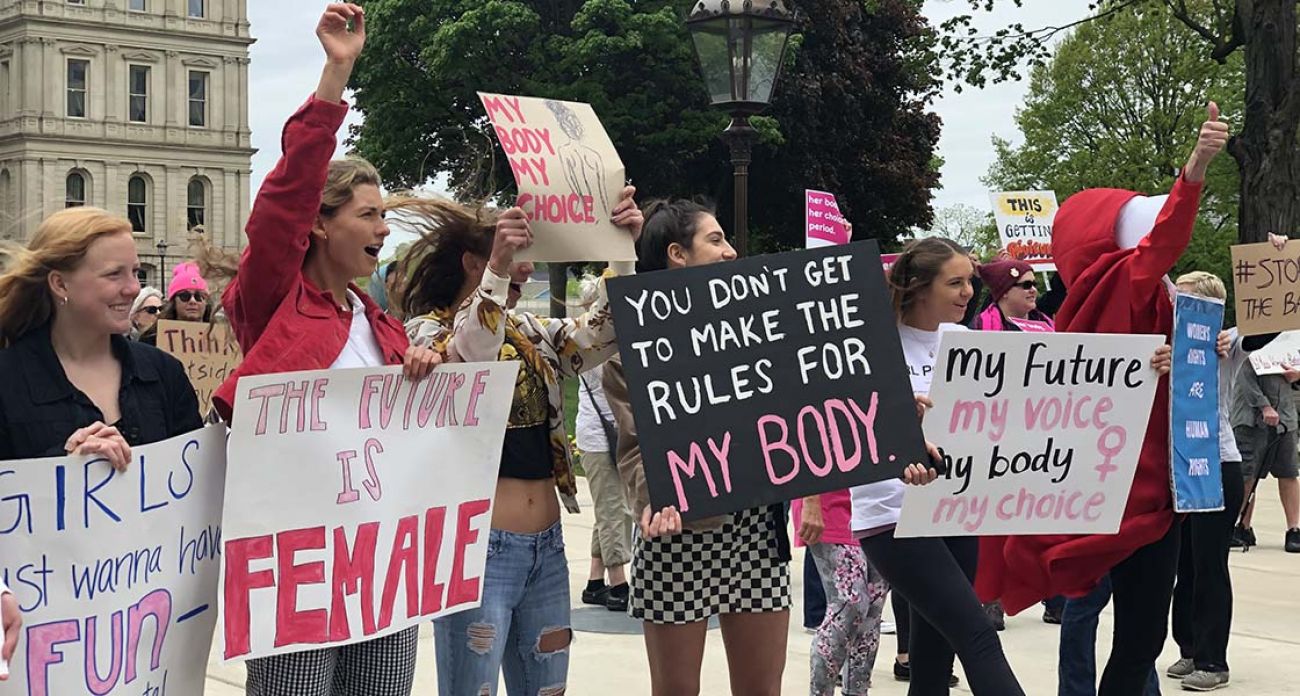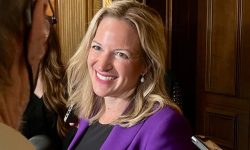New ballot initiative would ban abortions in Michigan after fetal heartbeat

August 2019: Planned Parenthood says 42,000 in Michigan at risk over abortion 'gag rule'
Update: Michigan abortion foes can call procedure ‘dismemberment’ on ballot petitions
The Michigan Heartbeat Coalition, a new anti-abortion ballot committee, filed a ballot initiative petition Tuesday morning to ban abortion after a fetal heartbeat is detected.
The new proposal is akin to what’s been proposed in at least 15 other states this year and most recently signed into law in Georgia. The measure effectively bans abortion after around six weeks of pregnancy, when the fetal heartbeat is first detected and before many women know they’re pregnant.
Corey Shankleton, president of the group, said the bill language was designed to provide an opportunity to challenge Roe v Wade, the landmark 1973 U.S. Supreme Court decision that guaranteed the right to abortion.
“The heartbeat is a more consistent, constant medical standard than the current use of viability,” which is the current point at which abortion becomes illegal, Shankleton said.
“It’s not an emotional appeal, it’s a scientific appeal. All of us know a heartbeat is known as a determination of life.”
Even if it is approved, the measure almost certainly would face a court challenge, especially as long as Roe v. Wade is the law of the land.
The proposal would make it a felony punishable by two to four years in prison for healthcare providers to perform abortions after a fetal heartbeat has been detected; it would not punish the woman seeking an abortion. If the woman dies during an abortion, the sentence for the provider would be raised to six to 15 years in prison.
The measure includes an exception for cases in which the abortion is necessary to save the woman’s life or “to prevent a serious risk of the substantial and irreversible impairment of a major bodily function.” It does not include an exception for cases of rape or incest.
Lauren Owens, a Michigan-based OBGYN specializing in family planning and a fellow at the American College of Obstetricians and Gynecologists, said the proposal would ban abortions at a point in embryonic development that many women don’t yet know they’re pregnant — particularly those who are not closely monitoring their cycle or seeking pregnancy.
“I think that these are dangerous for women’s health,” Owens said. “All of these are medically unnecessary bans that keep patients from getting the care that they want and they need.”
The proposal comes a week after another abortion restriction — to ban a common second-trimester abortion procedure called dilation and evacuation (D&E) — passed in the Michigan House and Senate. Gov. Gretchen Whitmer, a Democrat, vowed to veto the bills if they reach her desk, and Right to Life of Michigan filed their own ballot initiative to push the policy.
Both Right to Life and the Michigan Heartbeat Coalition would have to collect at least 340,047 valid petition signatures within 180 days after certification for their proposal to qualify for the ballot. Most groups collect thousands more to leave room for signatures invalidated by mistakes or duplications.
Shankleton said the Michigan Heartbeat Coalition will gather signatures with all-volunteer signature gatherers, and that the group already has several thousand volunteers. Organizers expect they need around 15,000 volunteers to make the ballot, he said.
If successful, state lawmakers could approve the initiated legislation before it goes to the ballot, which is likely under the GOP-led Legislature. If they choose not to, the measure would go to the statewide ballot in November 2020. If approved either way, the measure would become law and cannot be vetoed by the governor.
Abortion rights proponents condemned both proposals Tuesday. Lori Carpentier, president of Planned Parenthood Advocates of Michigan, said in a statement: “A ban is a ban is a ban.”
The proposals are “not about a specific procedure or specific timing – it is about banning all abortion – no matter why, no matter when,” Carpentier said. “These bans are harmful, unconstitutional, and deeply unpopular."
Genevieve Marnon, Legislative Director for Right to Life of Michigan, said seeking signatures for two abortion-related ballot initiatives at once may cause confusion and make it harder for both groups to bring their measures to voters.
She added the Michigan Heartbeat Coalition proposal is “imprudent” because Michigan already has a ban on all abortions that would go into effect if Roe v Wade is overturned. The Heartbeat Coalition’s ban is less restrictive than the current one, she said, and it may take precedence over the current ban if passed.
“We of course love enthusiasm and passion for a pro-life subject, we just want people to understand that Michigan is not” the same as other states that have recently supported heartbeat abortion bans, Marnon said.
“We have different state laws and what works in one state doesn’t necessarily work in another state.”
Shankleton countered that his group’s proposal includes a provision to prevent it from superceding the existing total abortion ban. Plus, he said, there’s a possibility Roe v Wade could be amended to only allow abortions before a heartbeat is detected rather than overturned completely, in which case Michigan’s ban wouldn’t come into effect.
“Our stance is why can’t we love them both?” Shankleton said. “We think both bills have value and they carry certain strategic strengths and yet we really need to fulfill them both.”
The national context
The number of proposed bans on first-trimester abortions has grown dramatically in recent years.
It’s a new type of restriction following years of policies that place restrictions on specific abortion procedures, types of clinics or those performed in the second-trimester, among others.
Highly restrictive policies such as bans on abortion after a fetal heartbeat is detected have become more popular since the U.S. Supreme Court became more conservative last year. The court now has five conservative-leaning justices that anti-abortion activists hope would consider overturning Roe v Wade.
“Everybody sees the momentum that’s happening” nationwide, Shankleton of the Michigan Heartbeat Coalition said.
In August 2018, the last time the Washington Post and ABC News polled voters on abortion access, 45 percent of respondents said the Supreme Court should leave the ability to get an abortion the same as it is now. Thirty percent said it should be made harder to get an abortion; 21 percent said it should be easier.
A 2014 study by the Pew Research Center found that 54 percent of Michiganders prefer abortion be legal in all or most cases, compared to 42 percent who said it should be illegal in all or most cases.
See what new members are saying about why they donated to Bridge Michigan:
- “In order for this information to be accurate and unbiased it must be underwritten by its readers, not by special interests.” - Larry S.
- “Not many other media sources report on the topics Bridge does.” - Susan B.
- “Your journalism is outstanding and rare these days.” - Mark S.
If you want to ensure the future of nonpartisan, nonprofit Michigan journalism, please become a member today. You, too, will be asked why you donated and maybe we'll feature your quote next time!




